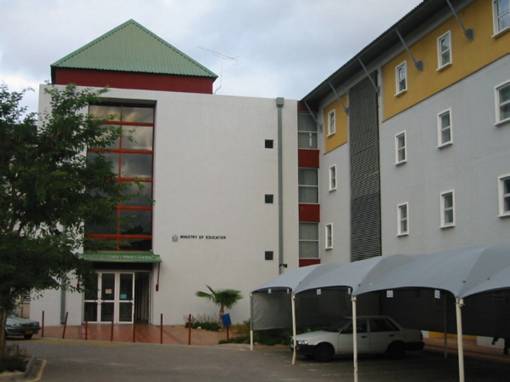 |
| Namibia Ministry of Education |
Last year the Ministry of Education (MoE) approved student loans and grants amounting to N$512 million and will spend N$600 million this year on student loans and grants.
In 2013, a large number of Namibian students applied for financial assistance to study outside the country, especially in some African countries, Asia, as well as Eastern and Western Europe but there are concerns over some of the institutions and the courses that they offer. Officials of the NSFAF view some of the foreign institutions as "dubious" and believe that in the long run they could jeopardise the employability of graduates.
The aim of the planned investigation is to validate the credibility of several foreign universities, some of which admit students with points as low as 10 to study medicine, engineering and other courses that normally require high marks.
Ambrosius M. Agapitus, the chairperson of the Namibia Students Financial Assistance Fund (NSFAF) Board said the aim of the planned urgent visiting programme is to "strengthen mechanisms of cooperation; to acquaint [the NSFAF] with the relevance and effectiveness of programmes offered by foreign institutions and to negotiate favourable terms and conditions of cooperation."
In 2013, a large number of Namibian students applied for financial assistance to study outside the country, especially in some African countries, Asia, as well as Eastern and Western Europe but there are concerns over some of the institutions and the courses that they offer. Officials of the NSFAF view some of the foreign institutions as "dubious" and believe that in the long run they could jeopardise the employability of graduates.
Most of the students who applied for assistance to study engineering, accountancy and medicine in some foreign countries have low pass marks for Grade 12 and the subjects that some of them took do not correspond with their chosen fields of study.
Agapitus, who last Friday addressed students, parents and guardians of students who applied for funding to pursue further studies abroad explained the investigation team will comprise of officials of the NSFAF, the Namibia Qualifications Authority (NQA), National Council for Higher Education (NCHE), the Health Professionals Council of Namibia (HPCNA) and the Engineering Council of Namibia. The envisaged visit will take place next month whereafter NSFAF will conclude the award of loans and grants to qualifying students for the year 2013.
Based on information received from some students studying abroad, NSFAF decided to "put on hold" the granting of loans and grants to students studying at some identified foreign institutions 'until such a time the outcome of the visit is concluded'. In 1997 at its inception the NSFAF helped a meager 1 000 students compared to the over 55 000 beneficiaries who were assisted by the fund in 2012. Since 2010 the fund has recorded an exponential growth of over 50 percent.
In as much as NSFAF encourages the trend by Namibian students to acquire knowledge, it is cognisant that some "unscrupulous individuals" could be offering bogus qualifications whose holders will fail to perform when offered jobs.
"Also, Namibian representatives in China, India and Russia have complained 'about these many Namibians' who want to further their studies in those respective countries, while many of the institutions there are not credible not even in their own countries," Agapitus said.
Hilya Nghiwete, the Under-Secretary for Finance and Administration in the Ministry of Education said the teams would visit those countries with the aim to determine the credibility of the institutions where Namibian students have applied and also to look for credible tertiary institutions where they could apply.
Agapitus told the students, parents and guardians who converged in the fully packed government auditorium that it remains doubtful that an institution, as he has seen, would admit up to a hundred Namibians in the first year of study.
"I have never seen that happening. Something must be wrong, something must be wrong in that country. Are we saying that all the people in that country are already learned and only Namibians would need to go there and also become learned?" Agapitus asked.
"We must investigate, people must go there and come back with a report and recommendations on which institutions are credible and which programmes in which institutions are credible," Agapitus stressed.
Furthermore, it emerged at the meeting that the police are investigating the authenticity of letters of admission sent from institutions in the Ukraine. When asked what would happen to students who are already studying at tertiary institutions that may not be credible abroad, Agapitus said: "Whose responsibility is it if the fund has not allocated a loan to a student and the student went there? Does the fund know the student has already left? No, they could never know because that person is not their student. The student can only become a student of the fund once they have been awarded a loan or a grant. If the question was asked by a student who is already on board of the fund then that becomes a problem of the fund."
"Nevertheless, students who are already abroad could be assisted if they are found to be in the right place," Agapitus added.




0 Comments